
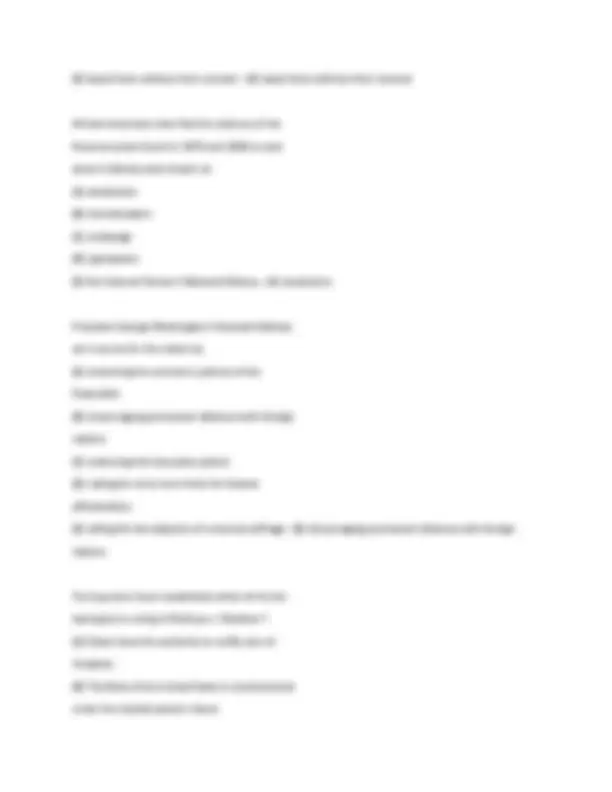
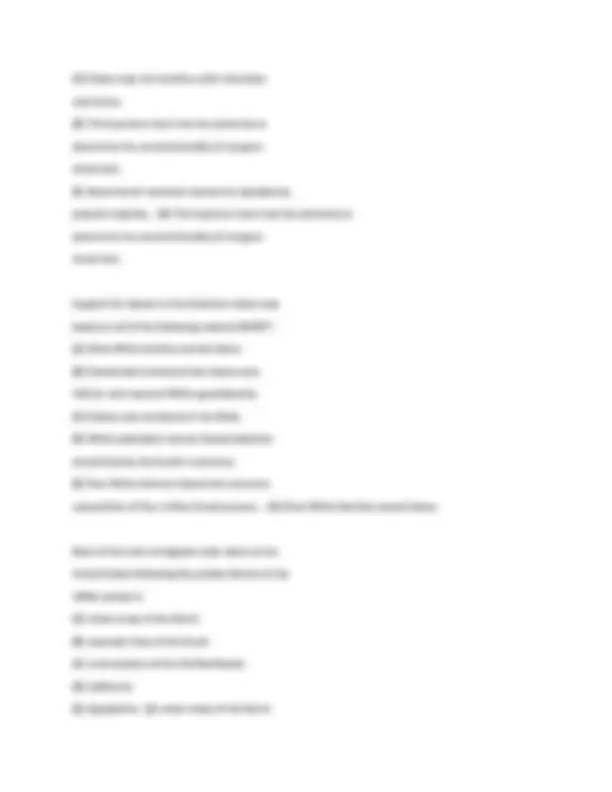
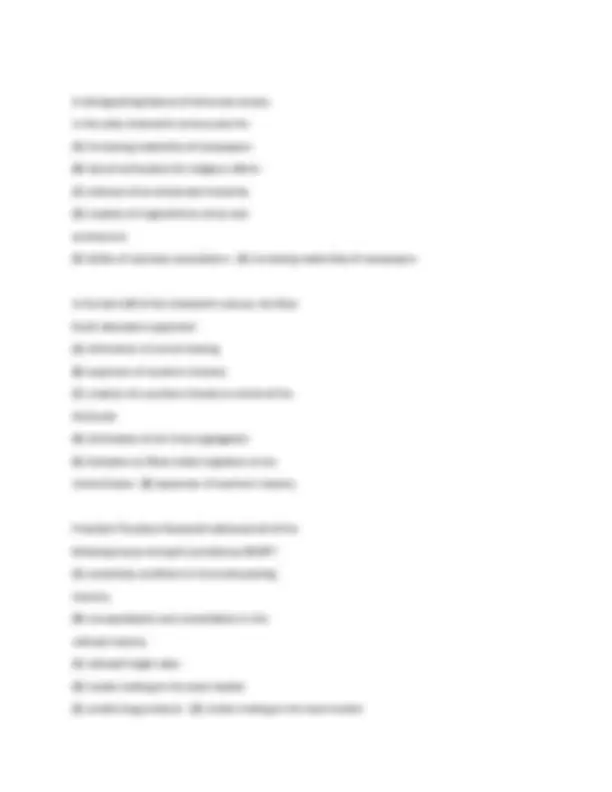
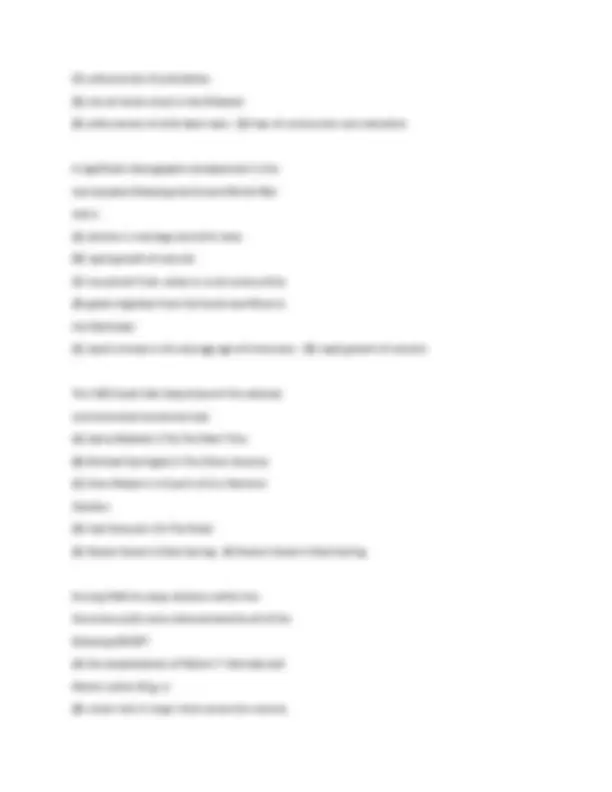
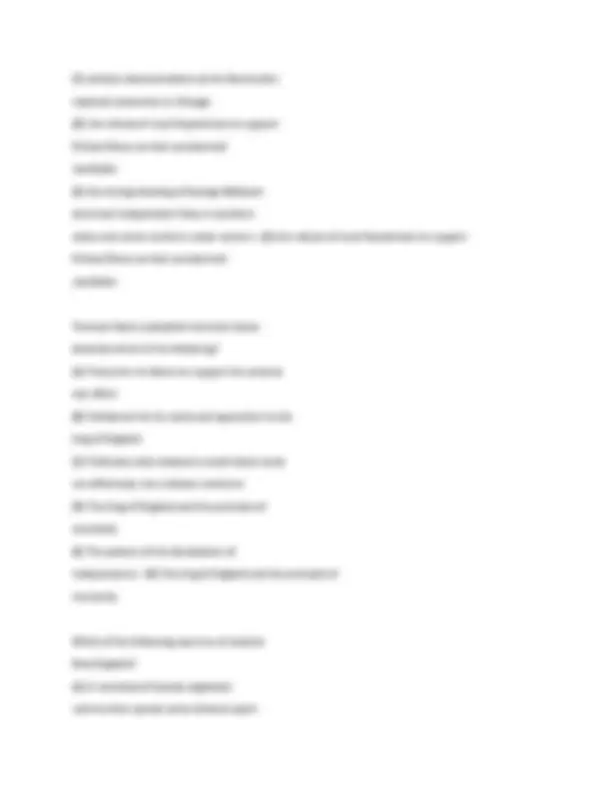
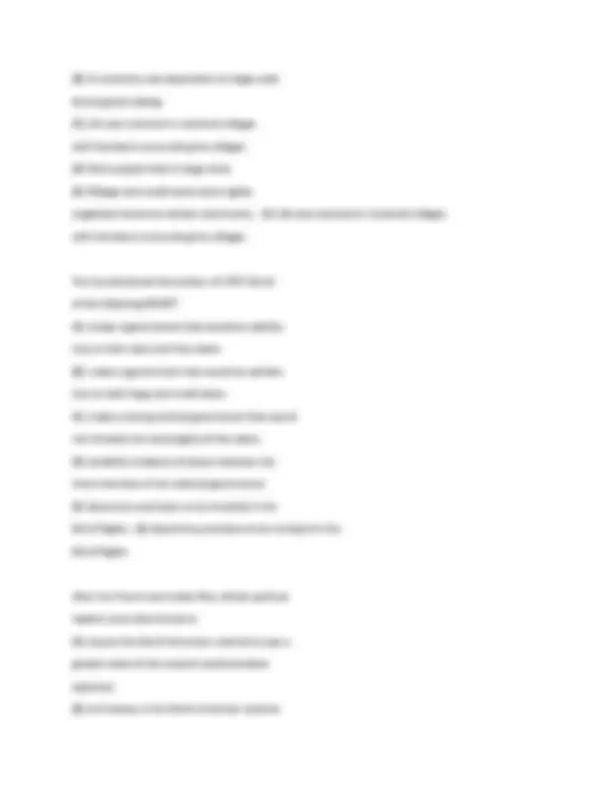
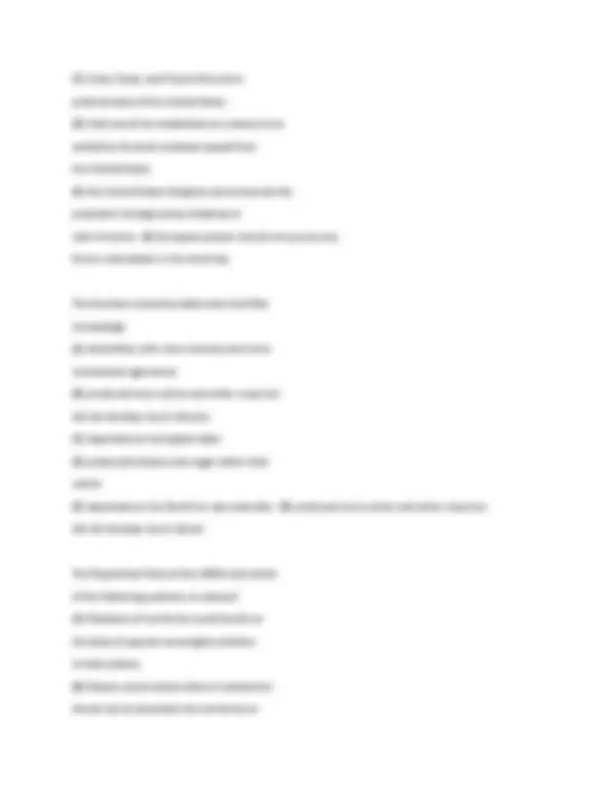
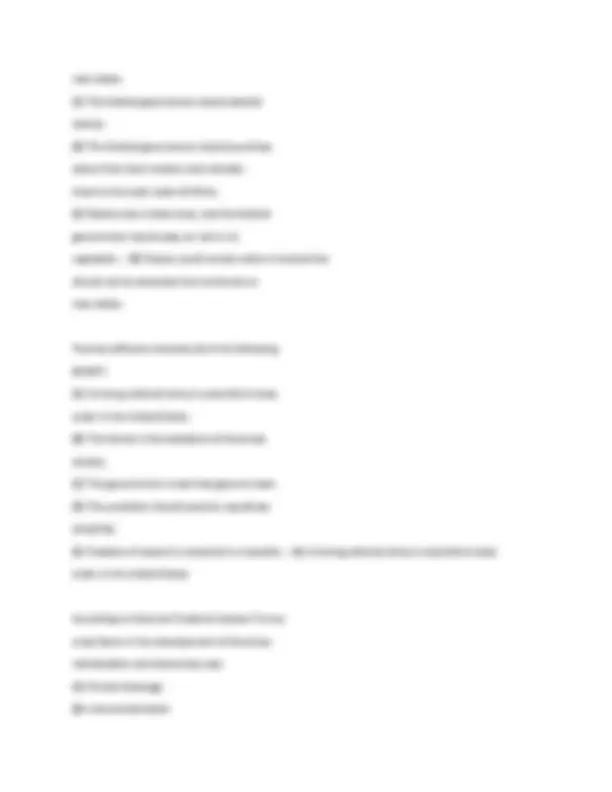
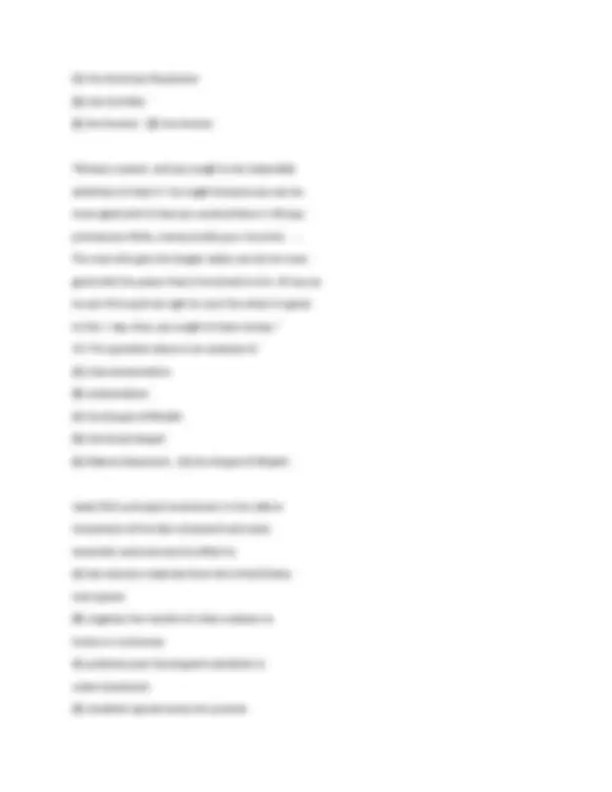
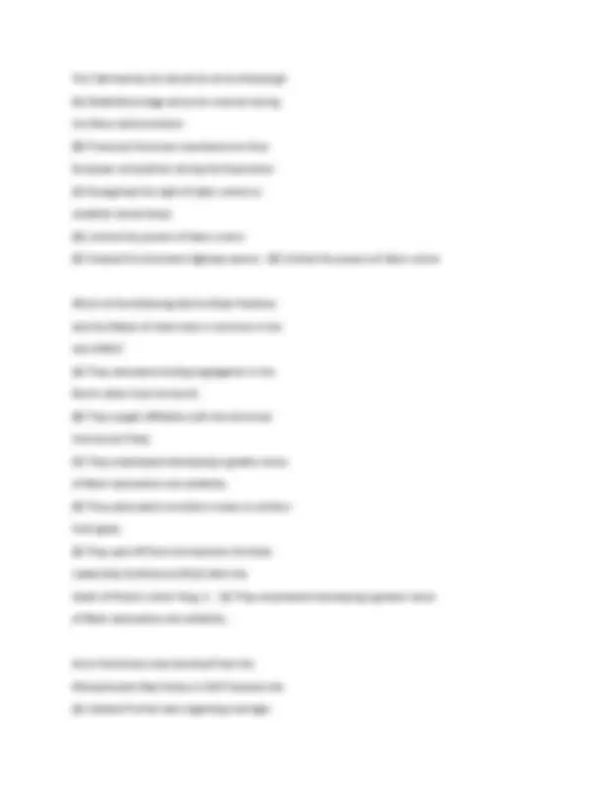
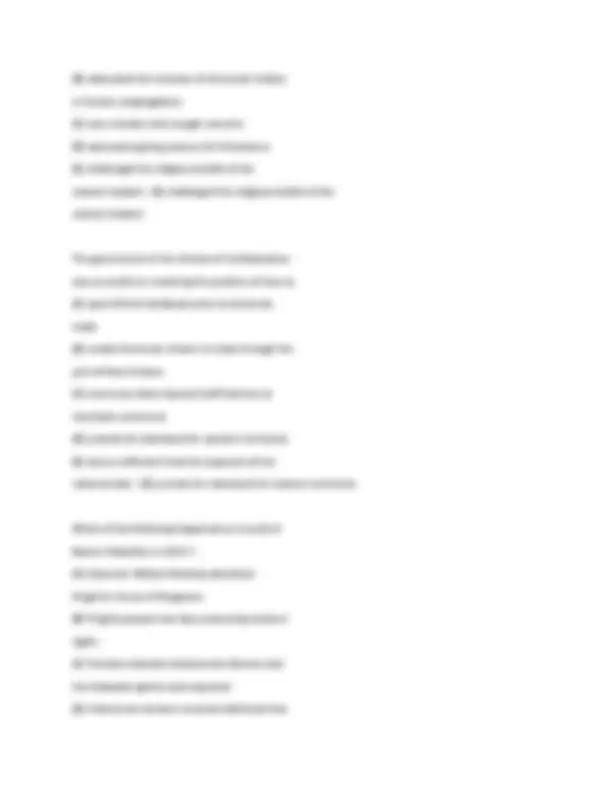
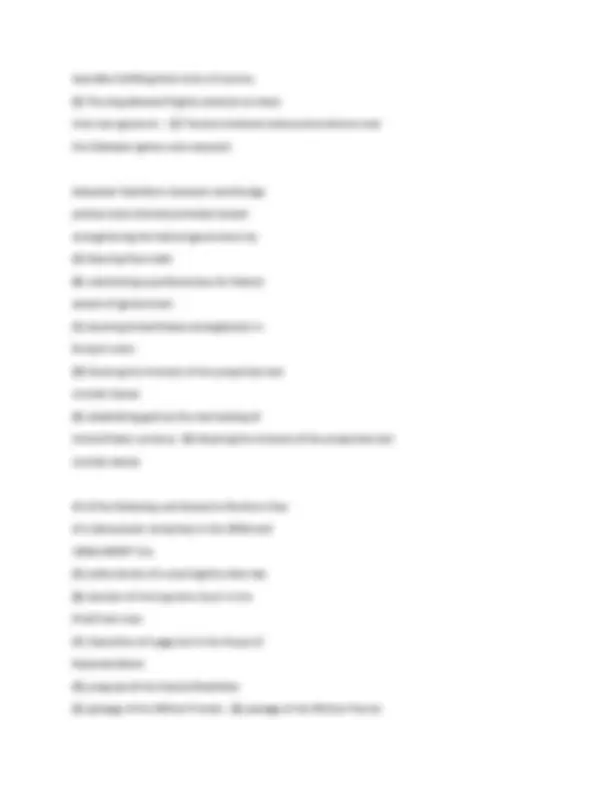
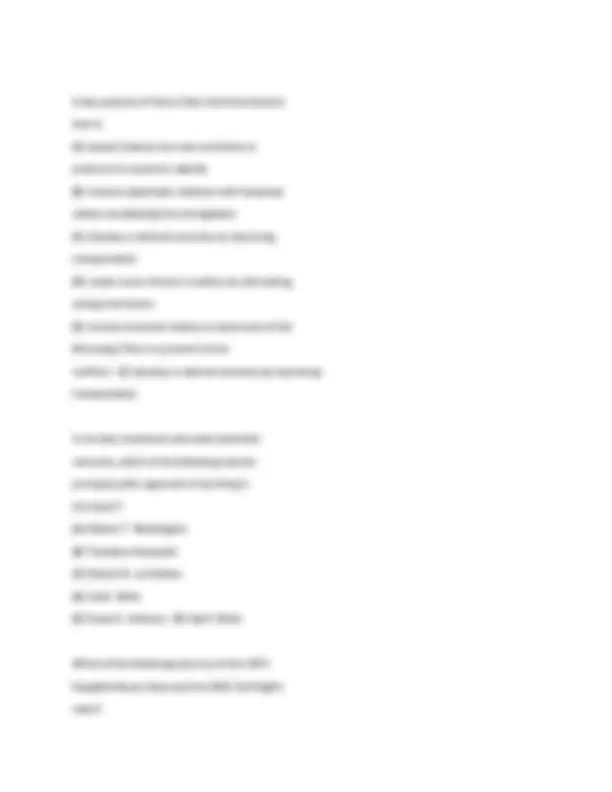
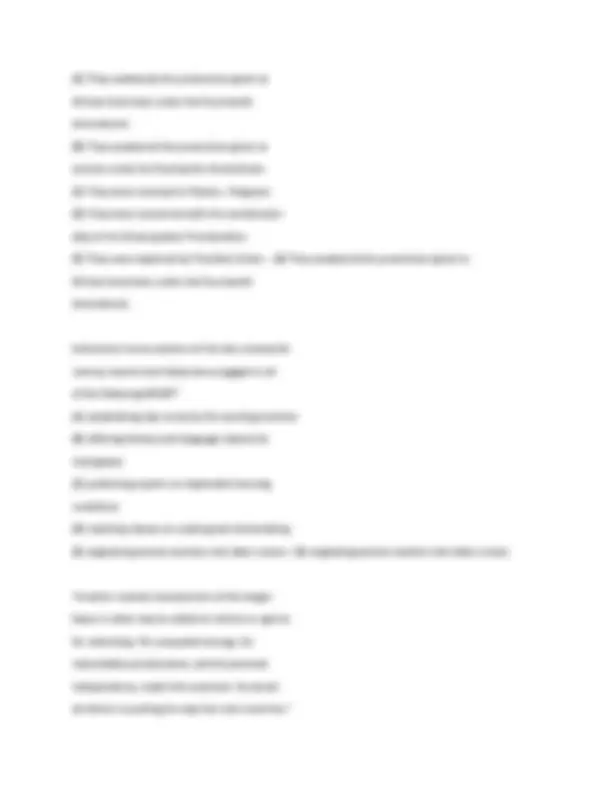
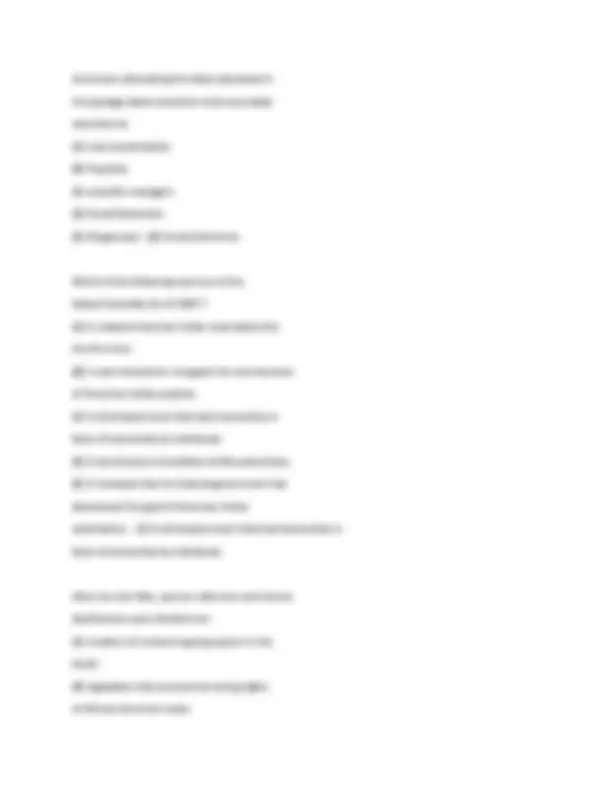
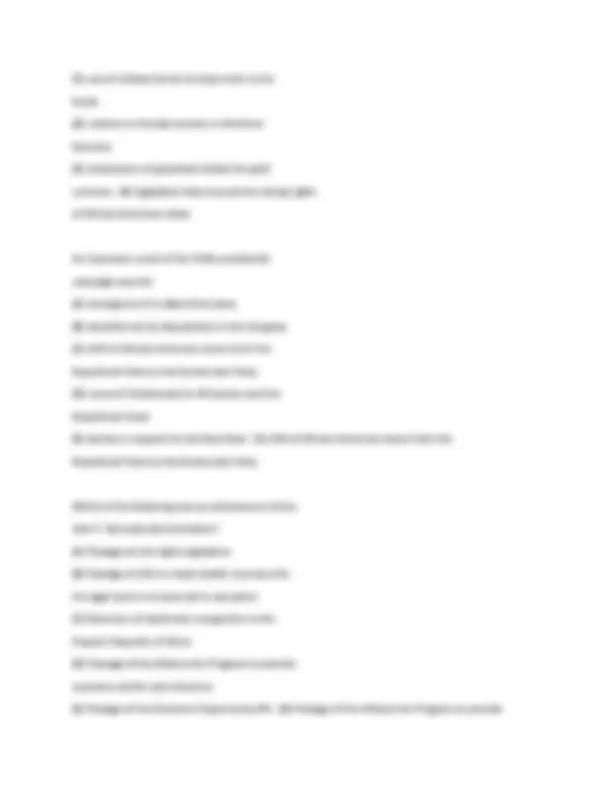
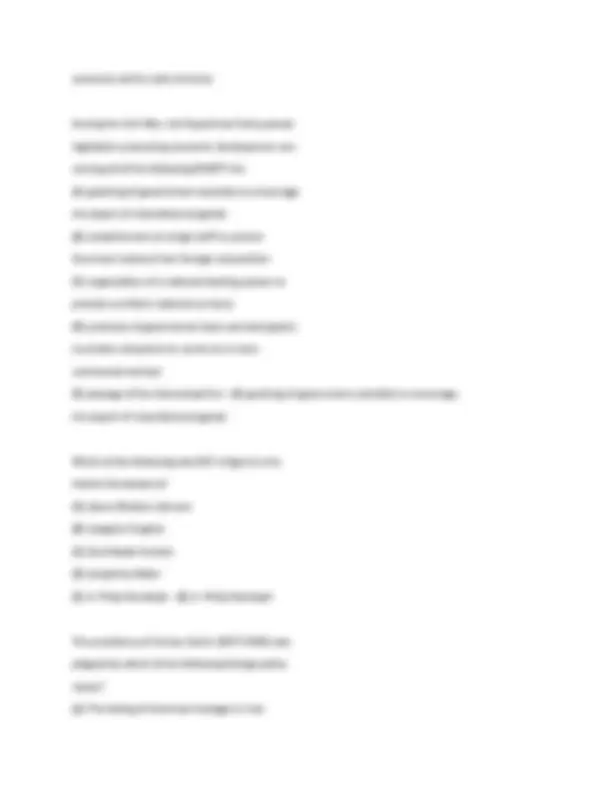
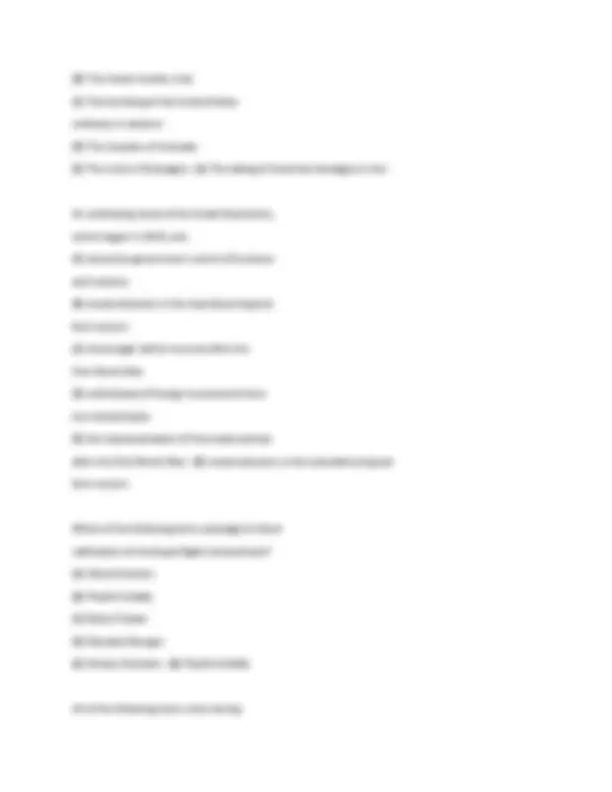
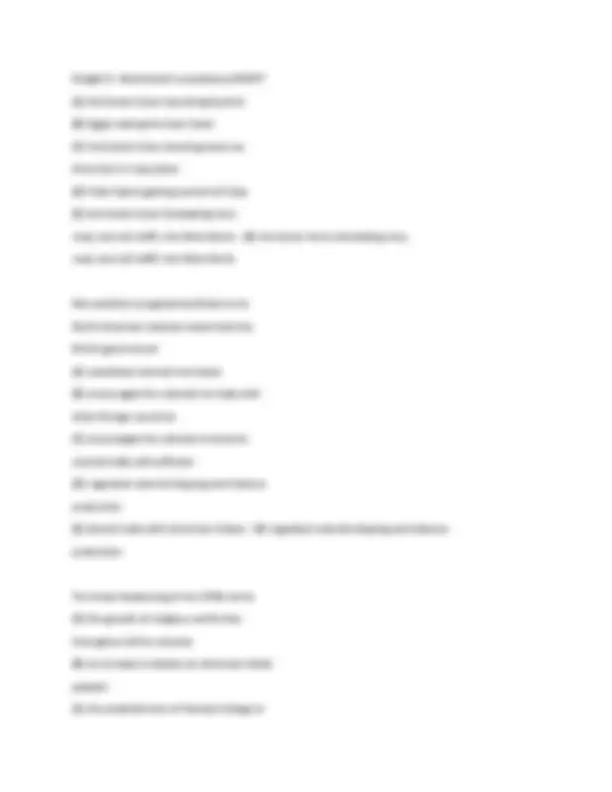
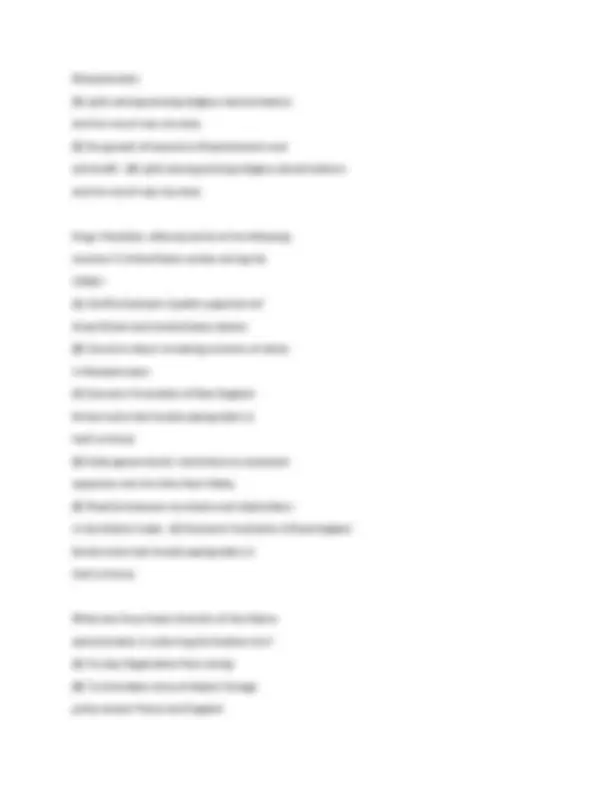
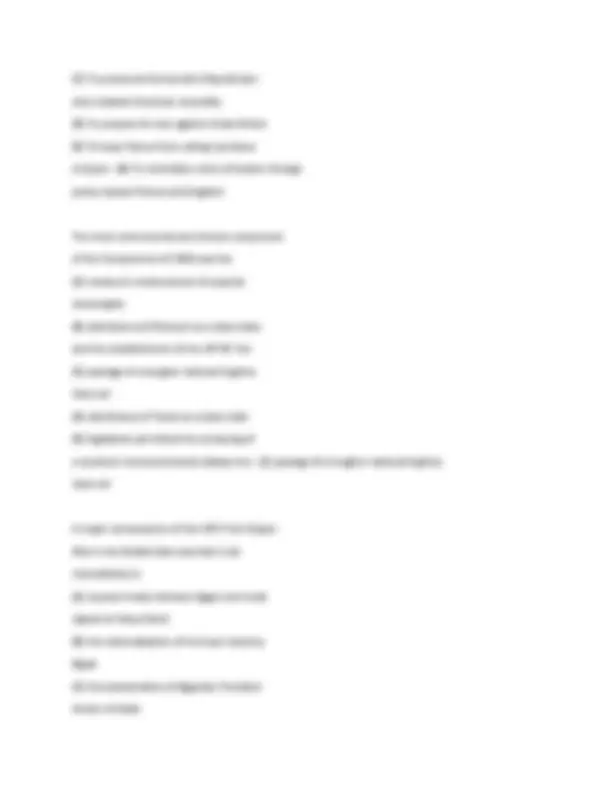
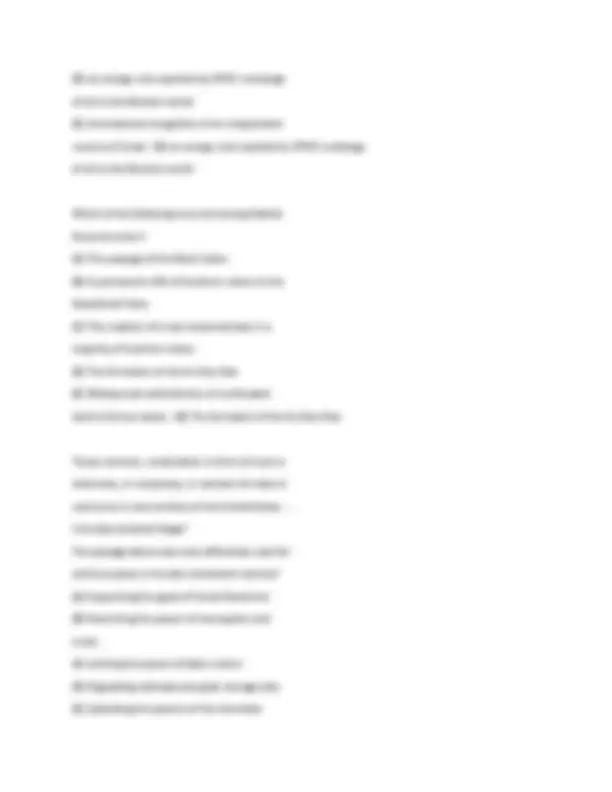
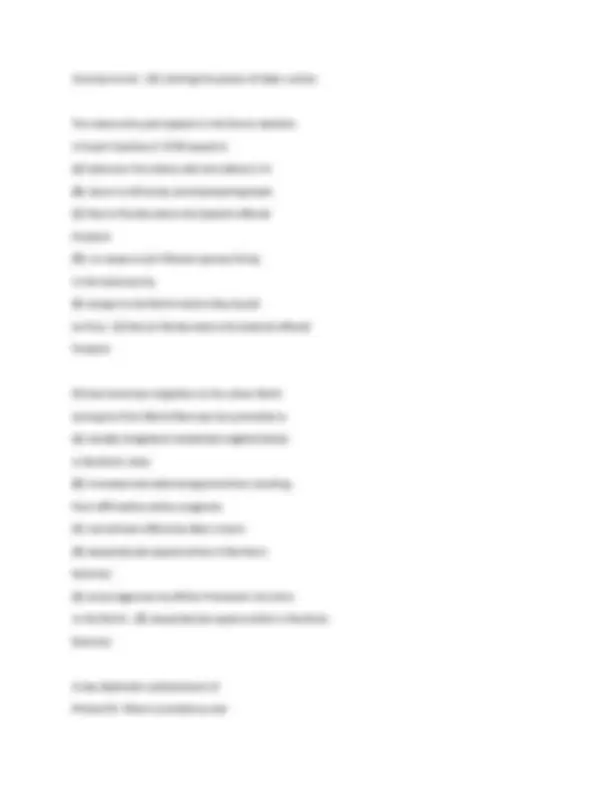
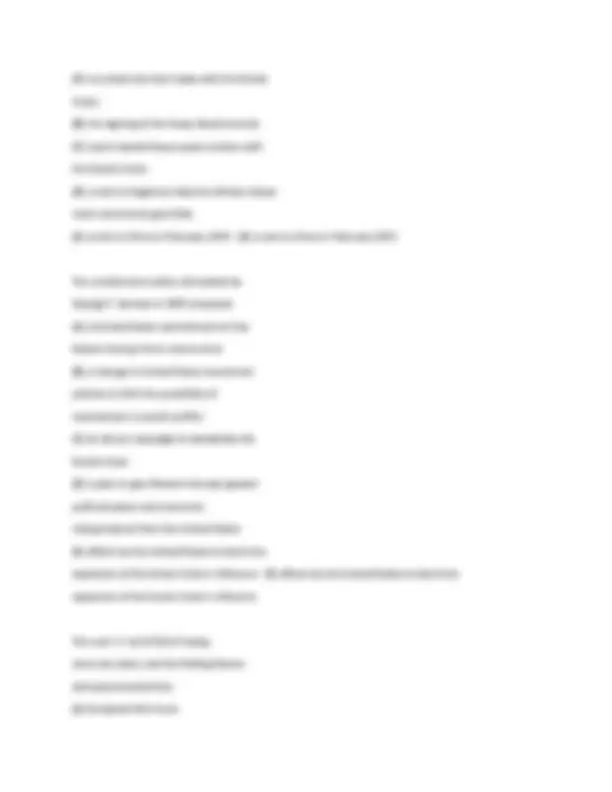
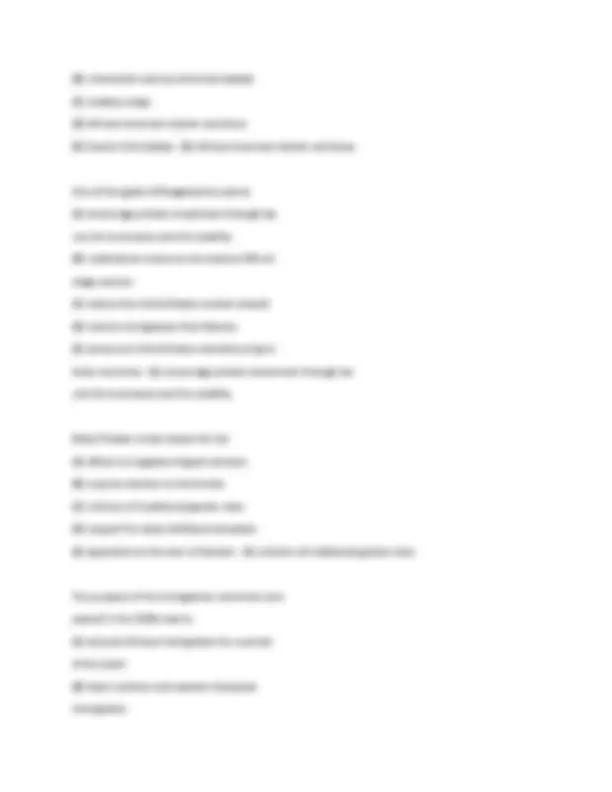
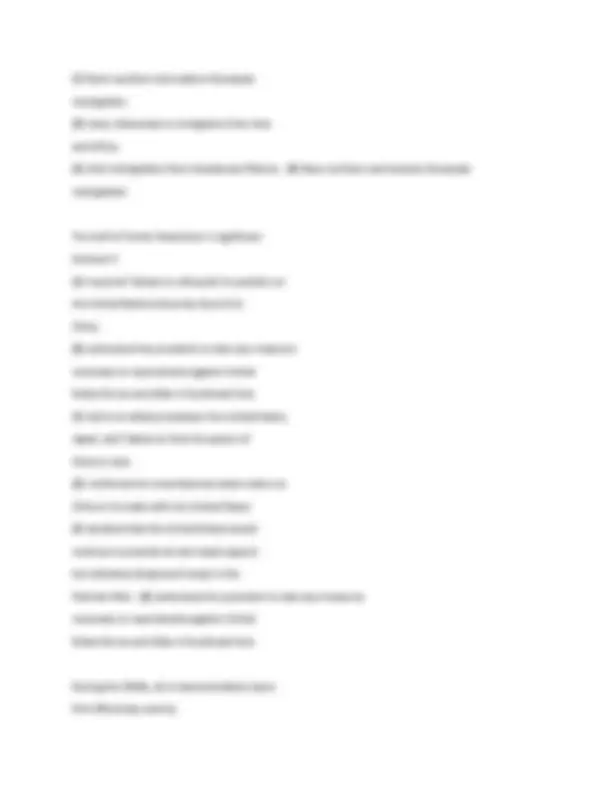
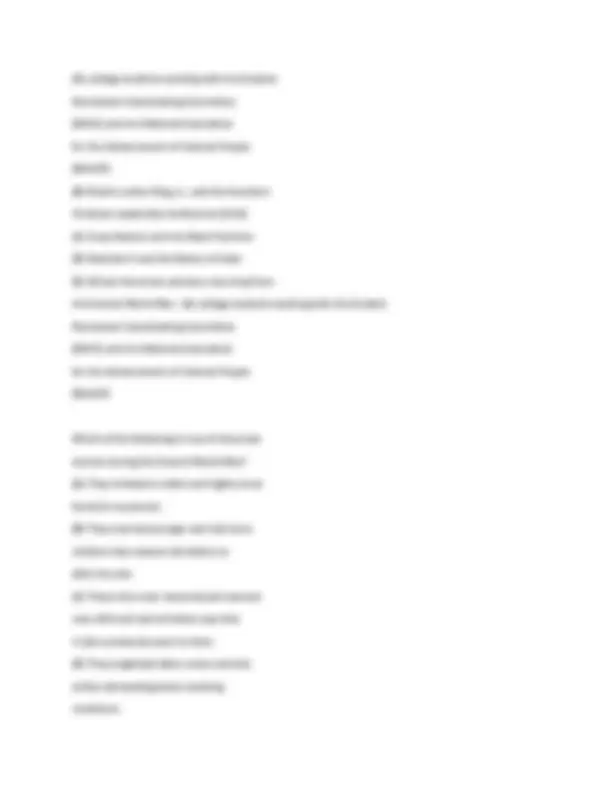
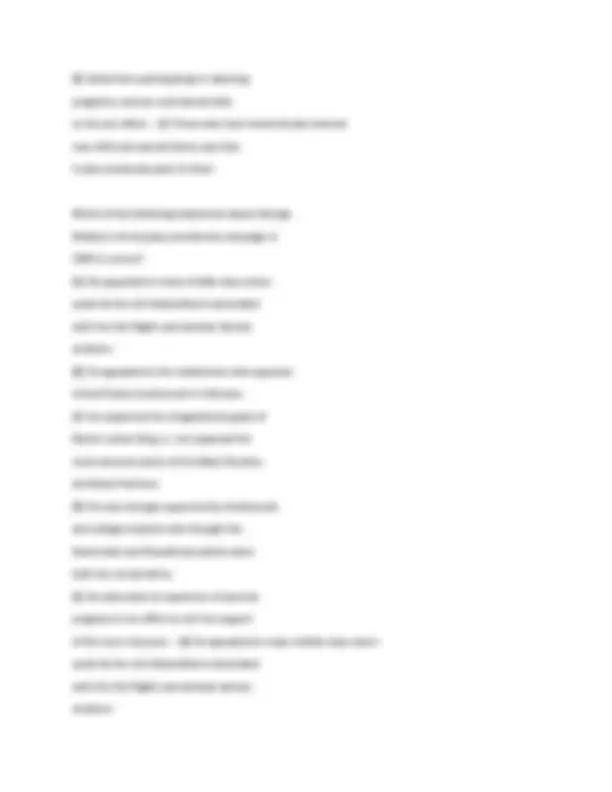


Study with the several resources on Docsity

Earn points by helping other students or get them with a premium plan


Prepare for your exams
Study with the several resources on Docsity

Earn points to download
Earn points by helping other students or get them with a premium plan
Community
Ask the community for help and clear up your study doubts
Discover the best universities in your country according to Docsity users
Free resources
Download our free guides on studying techniques, anxiety management strategies, and thesis advice from Docsity tutors
A comprehensive set of multiple-choice practice questions and answers covering key topics in american history. It is designed to help students prepare for apush exams and gain a deeper understanding of significant events, figures, and concepts in american history. The questions cover a wide range of periods and themes, including colonial america, the american revolution, the civil war, and the 20th century.
Typology: Exams
1 / 36

This page cannot be seen from the preview
Don't miss anything!





























APUSH Multiple Choice Practice Exam | Comprehensive Questions and Answers Latest Updated 2024/2025 With 100% Verified Solutions A majority of the early English migrants to the Chesapeake Bay area were (A) families with young children (B) indentured servants (C) wealthy gentlemen (D) merchants and craftsmen (E) disfranchised Catholics - (B) indentured servants Which of the following best describes Deism? (A) A belief that the course of each individual's life is predestined by God (B) A concept of toleration advanced by Quaker preachers (C) The belief that God had created the world but allowed it to operate through the laws of nature (D) A principle taught in colonial New England colleges (E) A radical theory encouraging free love and communal living - (C) The belief that God had created the world but allowed it to operate through the laws of nature France decided to aid the North American colonies in their war for independence primarily because France
(A) was working to establish democratic rule in European countries (B) saw the war as an opportunity to end the international slave trade (C) wanted to weaken the British empire (D) was allied with Spain, which had already joined the colonists' cause (E) had long been the primary trading partner of the North American colonies - (C) wanted to weaken the British empire In the eighteenth century, British colonists wishing to settle west of the Appalachians were principally motivated by (A) the comparatively small numbers of American Indians in the old Northwest (B) the low price and easy availability of land (C) freedom from the threat of Spanish authorities (D) a desire to escape overcrowded cities along the Atlantic coast (E) promises of tax breaks for those willing to establish frontier settlements - (B) the low price and easy availability of land British colonists in North America objected to the Stamp Act primarily because it (A) threatened the free press (B) disrupted trade with the West Indies (C) closed the colonial courts (D) enriched corrupt officials
(C) States may not interfere with interstate commerce. (D) The Supreme Court has the authority to determine the constitutionality of congres- sional acts. (E) Government contracts cannot be repealed by popular majority. - (D) The Supreme Court has the authority to determine the constitutionality of congres- sional acts. Support for slavery in the Southern states was based on all of the following reasons EXCEPT: (A) Most White families owned slaves. (B) Slaveholders believed that slaves were inferior and required White guardianship. (C) Slavery was condoned in the Bible. (D) White plantation owners feared abolition would destroy the South's economy. (E) Poor White farmers feared the economic competition of four million freed persons. - (A) Most White families owned slaves. Most of the Irish immigrants who came to the United States following the potato famine of the 1840s settled in (A) urban areas of the North (B) seacoast cities of the South (C) rural sections of the Old Northwest (D) California (E) Appalachia - (A) urban areas of the North
A distinguishing feature of American society in the early nineteenth century was the (A) increasing readership of newspapers (B) lack of enthusiasm for religious reform (C) embrace of an aristocratic hierarchy (D) creation of original forms of art and architecture (E) dislike of voluntary associations - (A) increasing readership of newspapers In the last half of the nineteenth century, the New South advocates supported (A) elimination of convict leasing (B) expansion of southern industry (C) creation of a southern literature critical of the Old South (D) elimination of Jim Crow segregation (E) limitation on West Indian migration to the United States - (B) expansion of southern industry President Theodore Roosevelt addressed all of the following issues during his presidency EXCEPT (A) unsanitary conditions in the meat-packing industry (B) monopolization and consolidation in the railroad industry (C) railroad freight rates (D) insider trading on the stock market (E) unsafe drug products - (D) insider trading on the stock market
intervene in China whenever necessary - (C) protect United States economic interests in China PLATFORM First. - That the union of the labor forces of the United States this day consummated shall be permanent and perpetual. Second. - Wealth belongs to him who creates it.... The interests of rural and civil labor are the same; their enemies are identical....
(C) enforcement of prohibition (D) rise of racial unrest in the Midwest (E) enforcement of child labor laws - (A) fear of communism and radicalism A significant demographic development in the two decades following the Second World War was a (A) decline in marriage and birth rates (B) rapid growth of suburbs (C) movement from urban to rural communities (D) great migration from the South and West to the Northeast (E) rapid increase in the average age of Americans - (B) rapid growth of suburbs The 1962 book that helped launch the national environmental movement was (A) James Baldwin's The Fire Next Time (B) Michael Harrington's The Other America (C) Alice Walker's In Search of Our Mothers' Gardens (D) Jack Kerouac's On The Road (E) Rachel Carson's Silent Spring - (E) Rachel Carson's Silent Spring During 1968 the deep divisions within the American public were demonstrated by all of the following EXCEPT (A) the assassinations of Robert F. Kennedy and Martin Luther King, Jr. (B) urban riots in major cities across the country
(B) Its economy was dependent on large-scale farming and trading. (C) Life was centered in clustered villages with farmland surrounding the villages. (D) Most people lived in large cities. (E) Villages and small towns were tightly organized around an artisan community. - (C) Life was centered in clustered villages with farmland surrounding the villages. The Constitutional Convention of 1787 did all of the following EXCEPT (A) create a government that would be satisfac- tory to both slave and free states (B) create a government that would be satisfac- tory to both large and small states (C) create a strong central government that would not threaten the sovereignty of the states (D) establish a balance of power between the three branches of the national government (E) determine provisions to be included in the Bill of Rights - (E) determine provisions to be included in the Bill of Rights After the French and Indian War, British political leaders were determined to (A) require the North American colonies to pay a greater share of the empire's administrative expenses (B) end slavery in the North American colonies
(C) encourage colonial expansion into the Ohio Valley by moving all American Indian peoples further west (D) strengthen the French colonial holdings in Canada and the northwest to discourage Spanish expansion (E) convert all Catholic colonists to the beliefs of the Anglican Church - (A) require the North American colonies to pay a greater share of the empire's administrative expenses The concept of republican motherhood includes the idea that women should (A) have the right to vote (B) hold public office (C) be educated to raise their children to be good citizens (D) be encouraged to seek employment (E) have as many children as possible - (C) be educated to raise their children to be good citizens The Missouri Compromise was a victory for antislavery advocates because it (A) provided for the gradual emancipation of slaves in Missouri (B) excluded slavery from all territory north of the Ohio River and east of the Mississippi River (C) prohibited slavery from future territorial acquisitions
(C) Cuba, Texas, and Puerto Rico were protectorates of the United States (D) Haiti would be established as a colony to be settled by formerly enslaved people from the United States (E) the United States Congress could overrule the president's foreign policy initiatives in Latin America - (B) European powers should not pursue any future colonization in the Americas The Southern economy before the Civil War increasingly (A) diversified, with more industry and more mechanized agriculture (B) produced more cotton and other crops but did not develop much industry (C) depended on immigrant labor (D) produced tobacco and sugar rather than cotton (E) depended on the North for raw materials - (B) produced more cotton and other crops but did not develop much industr The Republican Party of the 1850s took which of the following positions on slavery? (A) Residents of territories could decide on the basis of popular sovereignty whether to have slavery. (B) Slavery could remain where it existed but should not be extended into territories or
new states. (C) The federal government should abolish slavery. (D) The federal government should purchase slaves from their masters and relocate them to the west coast of Africa. (E) Slavery was a state issue, and the federal government should play no role in its regulation. - (B) Slavery could remain where it existed but should not be extended into territories or new states. Thomas Jefferson believed all of the following EXCEPT: (A) A strong national army is essential to keep order in the United States. (B) The farmer is the backbone of American society. (C) The government is best that governs least. (D) The president should practice republican simplicity. (E) Freedom of speech is essential in a republic. - (A) A strong national army is essential to keep order in the United States. According to historian Frederick Jackson Turner, a key factor in the development of American individualism and democracy was (A) Puritan theology (B) transcendentalism
delinquents (E) pass federal laws to end prostitution - (C) publicize poor housing and sanitation in urban tenements During Reconstruction, a major economic development in the South was the (A) creation of large commercial and banking centers (B) spread of sharecropping (C) rise of large-scale commercial farming (D) decline of the textile industry (E) emergence of the cotton economy - (B) spread of sharecropping A key goal of the Progressive movement was to (A) replace capitalism with socialism (B) transform the United States into an agrarian republic (C) use government power to regulate industrial production and labor conditions (D) eliminate class differences in the United States (E) bring about racial integration in public accommodations - (C) use government power to regulate industrial production and labor conditions During the Second World War, Japanese Americans were relocated because of (A) the need for skilled workers in specialized industries in Utah and Montana
(B) previous laws that had incarcerated German Americans (C) fear of possible subversive activity against the war effort (D) the fact that most Japanese Americans were not citizens (E) the continued efforts by the United States military to stop immigration to California - (C) fear of possible subversive activity against the war effort Which of the following resulted from the Cuban missile crisis? (A) The Soviets were allowed to keep existing missiles in Cuba but could not increase the number of missiles. (B) The United States agreed to withdraw from Berlin in exchange for Soviet withdrawal from Cuba. (C) The Soviets gained none of their objectives, while the United States emerged victorious. (D) The United States succeeded in eliminating all communist influence from the Western Hemisphere. (E) The Soviets withdrew their missiles from Cuba in exchange for a promise from the United States not to attack Fidel Castro. - (E) The Soviets withdrew their missiles from Cuba in exchange for a promise from the United States not to attack Fidel Castro.
(B) advocated the inclusion of American Indians in Puritan congregations (C) was a Quaker who sought converts (D) advocated giving women full inheritance (E) challenged the religious beliefs of the colony's leaders - (E) challenged the religious beliefs of the colony's leaders The government of the Articles of Confederation was successful in resolving the problem of how to (A) open British Caribbean ports to American trade (B) enable American citizens to trade through the port of New Orleans (C) overcome state-imposed tariff barriers to interstate commerce (D) provide for statehood for western territories (E) secure sufficient funds for payment of the national debt - (D) provide for statehood for western territories Which of the following happened as a result of Bacon's Rebellion in 1676? (A) Governor William Berkeley abolished Virginia's House of Burgesses. (B) Virginia passed new laws protecting workers' rights. (C) Tensions between backcountry farmers and the tidewater gentry were exposed. (D) Indentured servants received additional free
land after fulfilling their terms of service. (E) The king allowed Virginia colonists to select their own governor. - (C) Tensions between backcountry farmers and the tidewater gentry were exposed. Alexander Hamilton's domestic and foreign policies were directed primarily toward strengthening the federal government by (A) favoring free trade (B) substituting a parliamentary for federal system of government (C) averting United States entanglement in Europe's wars (D) favoring the interests of the propertied and monied classes (E) establishing gold as the sole backing of United States currency - (D) favoring the interests of the propertied and monied classes All of the following contributed to Northern fear of a slave power conspiracy in the 1840s and 1850s EXCEPT the (A) enforcement of a new fugitive slave law (B) decision of the Supreme Court in the Dred Scott case (C) imposition of a gag rule in the House of Representatives (D) proposal of the Ostend Manifesto (E) passage of the Wilmot Proviso - (E) passage of the Wilmot Proviso